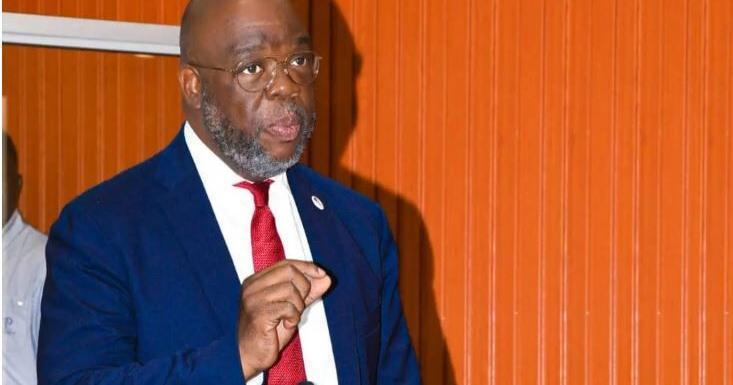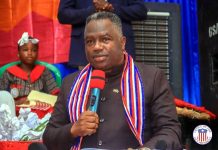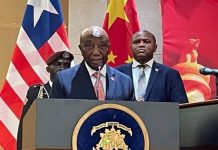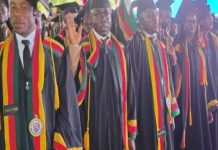Africa-Press – Liberia. The Senate is heightening its oversight of the country’s petroleum sector, demanding full disclosure from foreign oil companies Oranto Petroleum and TotalEnergies amid concerns over transparency, contract compliance, and protection of national interests. The call, led by Senator Edwin Melvin Snowe, Jr., Chairman of the Senate Joint Committee on Energy and Hydrocarbon, underscores growing public pressure for accountability in Liberia’s natural resource governance.
In a strongly worded letter to Madam Marilyn T. Logan, Director General of the Liberia Petroleum Regulatory Authority (LPRA), Senator Snowe stressed the need for exhaustive due diligence as lawmakers examine current and proposed Production Sharing Contracts (PSCs).
“The committee’s review process is not an event but takes on different forms,” Senator Snowe wrote.
“The information being requested will support comprehensive due diligence and guarantee informed decisions that reflect the facts and aspirations of the Liberian people for their hydrocarbon sector.”
The Senate is demanding documentation on the operational history and credibility of the companies, including performance data from Equatorial Guinea, Venezuela, and other jurisdictions where Oranto and TotalEnergies have operated.
Questions Over Oranto’s Operational Capacity
Oranto Petroleum, a Nigerian-owned firm and one of Africa’s largest privately held exploration entities, has often faced skepticism within civil society and global energy circles. Lawmakers now seek confirmation of Oranto’s claim of operating producing assets in Equatorial Guinea, requesting the specific name of the producing block, date of discovery, Oranto’s equity share, and whether the company holds an operating or participating interest.
The Senate also wants clarity on whether Oranto’s contract duration in Liberia has been extended beyond the seven-year limit mandated under the Petroleum (E&P) Law. Lawmakers requested evidence of parent company guarantees, a critical requirement to cushion Liberia against losses or liabilities should Oranto fail to fulfill its obligations.
Senator Snowe questioned the rationale behind variations in signature bonus payment structures, demanding explanations for why some companies pay upfront within thirty days of ratification while others receive staggered payment schedules.
“The Liberian people must be assured that all petroleum contracts entered into with foreign companies protect our sovereign and fiscal interests,” Snowe said.
Lawmakers also requested complete copies of all signed PSCs, details of terms related to ongoing bid rounds, documentation of all fiscal and operational safeguards, and provisions preventing unapproved block transfers or farm-outs.
The LPRA was instructed to submit all documents by Wednesday, November 26, 2025.
Liberia’s Troubled Oil Sector Governance
Liberia’s hydrocarbon sector has been mired in uncertainty for over a decade. Since the withdrawal of major oil players between 2014–2016—largely due to low global oil prices and inconclusive seismic drilling—the sector has struggled to regain investor confidence. Weak oversight, contract opacity, and allegations of political interference have further undermined public trust.
The reopening of offshore bid rounds has revived interest, but stakeholders argue that Liberia must learn from past missteps that resulted in unproductive contracts, missed revenue opportunities, and repeated renegotiations.
Civil society groups, including the Natural Resource Governance Institute (NRGI) and Publish What You Pay (PWYP), have long warned that opaque PSCs expose Liberia to unfavorable terms, environmental risks, and limited fiscal gains.
What the Deals Could Mean for Liberia
If properly managed, PSCs with Oranto and TotalEnergies could bring substantial benefits such as increased government revenue, Increased Foreign Direct Investment (FDI), job creation and local content opportunities, infrastructure development
A credible partner like TotalEnergies, with a strong global record, could boost investor confidence and attract additional energy-sector investment, exploration and potential production phases would generate employment and strengthen Liberia’s engineering, logistics, and service industries.
Revenue could be generated through signature bonuses, royalties, taxes, and Liberia’s statutory 10% equity interest—a critical source of long-term national income.
Major petroleum companies often invest in ports, roads, and energy infrastructure that benefit the broader economy.
However, these benefits hinge heavily on the credibility of the companies involved and the government’s ability to negotiate, enforce, and monitor contracts.
Since the disclosure of the deals by the government, stakeholders across Liberia have offered mixed reactions.
Some government critics argue the Senate’s scrutiny will strengthen Liberia’s credibility.
“The call for transparency signals to investors that Liberia is serious about regulatory governance,” said one said. “This will attract reputable companies and reduce the risk of signing deals that do not benefit the country.”
Government supporters have argued that TotalEnergies brings capacity and technical know-how that could transform Liberia’s dormant hydrocarbon space.
“Oversight is good, but we must not scare away investors,” Cllr. Kanio Gba-Gbalah noted in a lengthy commentary a few weeks ago.
Critics, however, warn that poor enforcement and weak regulatory controls may still undermine the benefits.
“This is not the first time Oranto is being questioned,” said former Speaker of the House of Representatives, J. Fonati Koffa. “Liberia must avoid awarding blocks to companies that lack financial or technical capacity. The country has suffered enough from speculative operators.”
Koffa and other critics, such as Senator Amara Konneh and other stakeholder pointed out the historical risks associated with Oranto.
“Staggered signature bonus payments often indicate financial weakness from companies. Liberia must insist on strong and upfront commitments,” Sen. Konneh said.
There are also concerns that political interference could influence decision-making, weakening the Senate’s oversight ambitions.
Senator Snowe—who also serves in key Senate committees and leads Liberia’s ECOWAS parliamentary delegation—reaffirmed that the review is based on principle, not politics.
“It is imperative that all agreements entered into with foreign petroleum companies are fully transparent and protect the sovereign interests of Liberia,” he said.
The LPRA has not yet issued a public response.
Many believe that as Liberia attempts to rejuvenate its hydrocarbon sector, the Senate’s demand for transparency could represent a major turning point in natural resource governance. Whether the process results in strengthened public trust and improved economic outcomes—or continues the cycle of opaque, contested oil deals—will depend on the government’s ability to enforce transparency, demand corporate accountability, and prioritize national interest over political expediency.
For More News And Analysis About Liberia Follow Africa-Press






